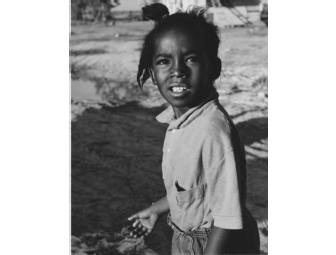Art, Posters, Photos
Farm Worker Child Photograph
- Item Number
- 112
- Estimated Value
- 2000 USD
- Sold
- 667 USD to snhirsch
- Number of Bids
- 1 - Bid History
Item Description
This is a vintage photograph of a "Black Okie" child of farm workers in Teviston, California. ~ 8x10 and in excellent condition. Displayed in Don't Cry for me Babey, a controversial multimedia exhibit at San Francisco's deYoung Museum. Ernest Lowe took the photo in 1964 as part of a documentary study of this community, which also included radio broadcasts on KPFA-FM. He made the silver halide print in 1965.
The deYoung Board of Directors attempted to ban the show where this photo appeared, but the photographer stopped this by threatening a city-wide storefront exhibiting the works & condemning the ban.
http://www.takestockphotos.com/pages/lowe.html
Item Special Note
About the photographer:
Ernest Lowe studied photography in the late 50's with the noted social documentarian, John Collier Jr., and his models were the classic images of Dorothea Lange, Walker Evans, and other Farm Security Administration photographers. These influences are reflected strongly in his work, which in some ways looks like a new page from the old FSA files. In 1959 Lowe joined the staff of Pacifica radio station KPFA and almost immediately began documenting the lives of migrant farm workers.
"It was natural for me to combine interviewing for a radio documentary with photography," Lowe recalled. "I'd just walk up to people in a camp or an orchard and say, 'I hear you folks are getting a raw deal. I'd like to take your pictures and talk with you so people back in the city can do something about it." They very seldom turned him down. Many of these recorded interviews have survived. Working before conflict erupted, Lowe also enjoyed access to vineyards, migrant camps and the inner workings of agribusiness that later photographers were denied. These early pictures also reveal the multi-racial face of migrant labor. Blacks, Anglos, Japanese and Filipinos are pictured, as well as Latinos.
At the end of the first year, Lowe showed his work to Dorothea Lange, who declared, "This is my family album," and loaned the photographer a 35mm Contax and a gift to cover film and expenses. In the fall of 1964, Lowe moved his family to the San Joaquin Valley and spent a year documenting the unincorporated African-American community of Teviston.
Captured mostly in medium format, Lowe's images are carefully composed, quiet moments, seemingly frozen in time. Lowe's people can be monumental - icons of migrant life - but the images are also respectful, intensely personal portraits.
Donated By:
Ernest & Grace Lowe
The Nation Magazine stores data...
Your support matters, so The Nation Magazine would like to use your information to keep in touch about things that may matter to you. If you choose to hear from The Nation Magazine, we may contact you in the future about our ongoing efforts.
Your privacy is important to us, so The Nation Magazine will keep your personal data secure and The Nation Magazine will not use it for marketing communications which you have not agreed to receive. At any time, you may withdraw consent by emailing Privacy@frontstream.com or by contacting our Privacy Officer. Please see our Privacy Policy found here PrivacyPolicy.





